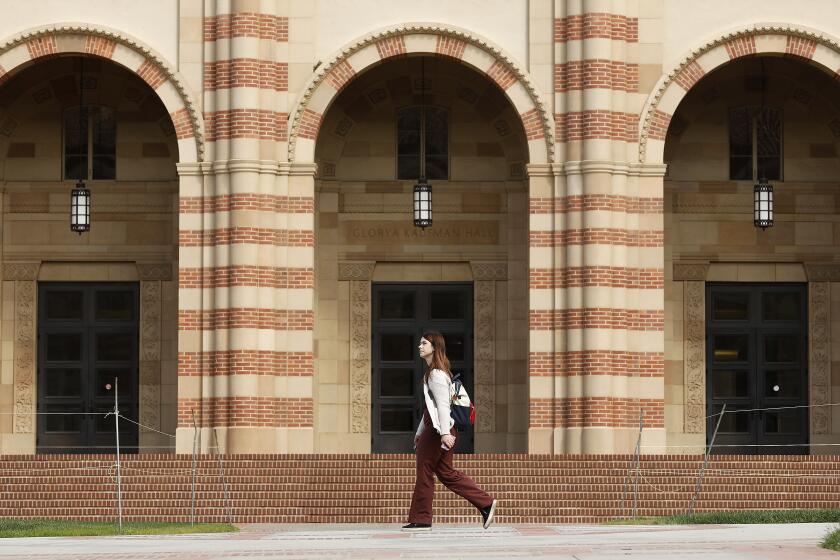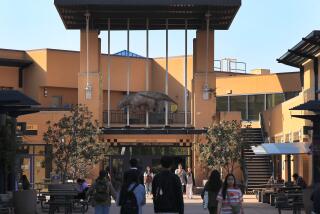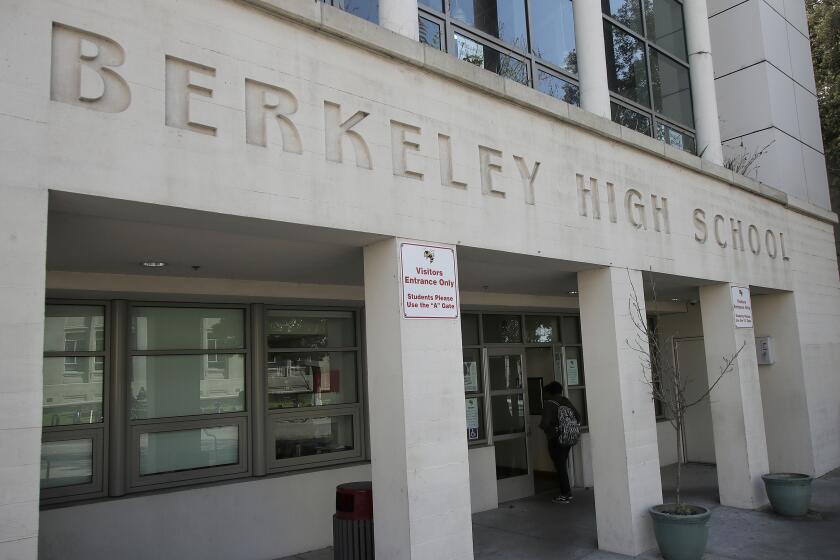UC raises tuition despite student outcry, touting more financial aid and budget stability

University of California regents, citing the need for financial stability and more grant aid, approved a tuition increase Thursday following widespread student protests and two years of debate.
The 4.2% increase in tuition and fees — $534 added to the current annual level of $12,570 — will apply only to incoming undergraduates entering in fall 2022 and stay flat for up to six years for them. Successive undergraduate classes would get a similar deal — one increase tied to inflation in their incoming year with tuition frozen for six years.
The undergraduate tuition increase includes a 2% surcharge for the incoming class next year, declining for subsequent classes until it is phased out by 2026. Graduate student tuition would be adjusted annually by the rate of inflation.
The plan aims to bring financial predictability to families, help struggling campuses maintain educational standards and make a UC education more affordable for many low-income students by raising more revenue for financial aid, UC President Michael V. Drake said.
He oversaw a similar tuition plan at Ohio State University before taking the reins at UC last year and said it had increased financial aid, lowered student debt levels and increased student diversity. Under the plan, 45% of tuition revenue raised from California students would be returned to them through financial aid.
The regents’ action marked UC’s second tuition increase since 2011 and came after two years of discussion. It was set for a vote last July but shelved with the onset of the COVID-19 pandemic.
Drake told regents Thursday that the financial squeeze on campuses over the last several years has resulted in negative fallouts on students — more crowded classrooms and dorms, less interaction with faculty and more difficulty in accessing courses needed to graduate.
“This is not sustainable, and it is not acceptable,” he said. “This plan proposes a much more stable and secure way forward for students and for the university.”
Opponents of the plan, however, have sharply questioned raising tuition amid a pandemic that has upended financial stability for so many families and after Gov. Gavin Newsom and the Legislature provided the university system with $1.27 billion, the largest ever single-year infusion of state funding, for the 2021-22 fiscal year.
The UC Student Assn. and several other campus organizations lobbied against the increase, using a #stoptheforeverhike social media campaign. They argued that the plan would hurt students who fall through the cracks — LGBTQ students whose parents refuse to pay college costs, immigrants here without legal authorization who don’t qualify for in-state tuition and low-income nonresident students hit by fluctuating exchange rates and limited financial aid access.
Students who spoke out against the tuition plan during the public comment period Thursday also said it would increase financial burdens on those who already struggle to personally pay the $10,000 UC expects them to contribute to their education and reduce racial and economic diversity. After the vote, they expressed disappointment.
“While we were not successful in blocking this proposal, we will closely follow the implementation of this plan and continue to zealously fight for a more affordable, accessible, and quality university that meets the needs of UC students,” said student association President Aidan Arasasingham, a recent UCLA graduate.
The vote was 17-5, with opposition by ex-officio regents Lt. Gov. Eleni Kounalakis, Supt. of Public Instruction Tony Thurmond and Assembly Speaker Anthony Rendon along with Regent Laphonza Butler and Student Regent Alexis Atsilvsgi Zaragoza. Kounalakis and Rendon said it was the wrong time to raise tuition, especially with the state’s historic funding increase to UC.
But Alumni Regent Cheryl Lott told regents that guaranteeing one tuition level for six years would be a “huge benefit” to students. While she was a UCLA law student, she said, her tuition abruptly increased by 35% between her first and third years.
Several regents who expressed skepticism when the issue was discussed in May voted for the plan after UC officials tweaked it to address their concerns. Regent Eloy Ortiz Oakley, for instance, had fretted that tying tuition increases to the rate of inflation could result in steep new charges if consumer prices soar. But the final plan will calculate inflation at a three-year rolling average of the California Consumer Price Index and cap any increase at 5%.
Regents retain the ability to revise student charges for any reason at their discretion and will be required to reauthorize the plan in five years under an amendment by Zaragoza.
Board Chair Cecilia Estolano also shifted from what she had called her initial “super skeptical” position to support, noting that more financial aid revenue generated by the plan could help lower the debt burden on students.
She also has said that the tuition plan amounted to a progressive tax, which would be a fair way to raise money for the additional faculty, staff, mental health counselors and other support that students need.
“You can’t buy excellence on the cheap,” she said Thursday.
More than half of UC undergraduates would not be affected by the increase, since their tuition and fees are covered by financial aid. UC officials say that more than 106,000 California undergraduates would receive more grant aid under the plan, giving them additional funding for housing, food, books and other nontuition expenses.
Over the last two decades, UC officials said, the system’s core funds have increased by 9% while enrollment has grown by 71%, resulting in a 36% drop in funds paid per-student.
That financial squeeze prompted the majority of campus chancellors to call for a tuition increase last year as they slashed budgets, dug into reserves, borrowed funds and substantially halted hiring to address what they called one of the worst financial crises they’ve ever collectively faced, fueled by the pandemic.
UC Berkeley, for instance, is particularly dependent on tuition, since it has no medical center to generate additional revenue. The campus has been hit by two successive budget holes amounting to $150 million in 2016, then $340 million last year after the pandemic led to big losses and higher costs.
We want to hear from California college students about the coming school year. Fill out our survey and tell us what you’re excited about, nervous about or just plain confused by.
At UCLA, student-faculty ratios have increased from 25 to 1 in 2003-04 to 29 to 1 in 2019-20. And UC Riverside, like the other campuses, has struggled with inadequate student services and facilities in deep disrepair. Mary Gauvain, a UC Riverside professor and Academic Senate chair, said it was getting “harder and harder” to maintain UC excellence as enrollments continue to surge without a parallel increase in tenure-track faculty.
The tuition revenue, UC officials said, will help pay for needed repairs and maintenance, reduce class sizes, boost student instruction, enhance student services and provide more support to improve graduation rates and reduce achievement gaps.
More to Read
Start your day right
Sign up for Essential California for news, features and recommendations from the L.A. Times and beyond in your inbox six days a week.
You may occasionally receive promotional content from the Los Angeles Times.








